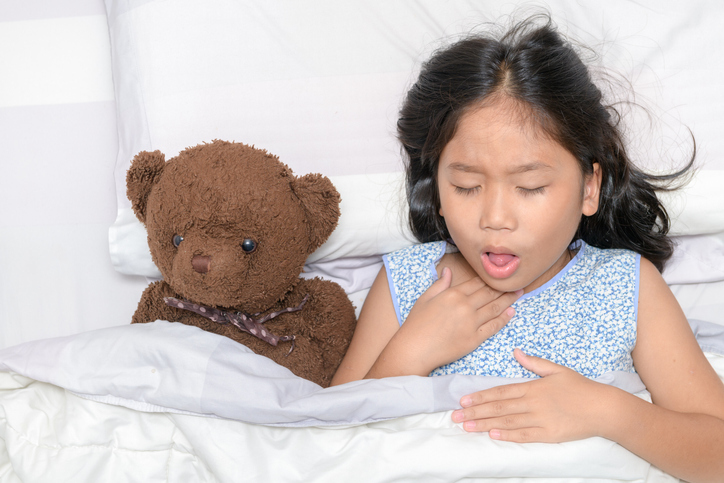How can parents tell the difference between bronchiolitis and the common cold?

When a child develops phlegm, a fever, a cough, or a runny nose, most parents rightly assume they just have a common cold. However, when a child's symptoms are accompanied by shortness of breath, you should be careful for signs that they are suffering from bronchiolitis.
Take the case of Mrs Wong and her daughter Kaka as an example. When Kaka was one month old, she developed a cough that lasted for three days. Because of this, Mrs Wong brought her to a paediatrician for a consultation. During the examination, the doctor discovered that Kaka not only had a cough, but was feverish and short of breath. Her heart was also beating extremely fast, up to 200 beats per minute. Because of this, the doctor recommended that she go to a hospital for further treatment.
At the hospital, the medical staff tested Kaka's nasal mucus and determined that she had a respiratory syncytial viral infection. The next day, her condition worsened, with symptoms that included serious coughing and a crackling sound in her lungs. After an evaluation, the doctor confirmed that the respiratory syncytial virus had caused bronchiolitis.
According to Dr Phillip Sham, a Paediatric Specialist at Gleneagles Hospital Hong Kong, children under three have a high risk of getting bronchiolitis. Since their immunisation systems aren't fully developed, once they get infected with a virus, their bodies will take longer to eliminate it. In addition, children in this age group frequently touch their nose and rub their eyes, which can further increase the risk of infection.
"When a child is infected, their tiny respiratory tract swells and narrows due to inflammation, which can trigger symptoms such as sputum, fever, coughing, or a runny nose, sometimes even followed by vomiting and diarrhoea," Dr Sham explains. "Since these symptoms are similar to the common cold, parents may simply assume that is all it is. However, they should be warned that a common cold generally does not cause any shortness of breath."
Dr Sham notes that most of the symptoms of bronchiolitis mentioned above will gradually go away within 10 days. If a child's symptoms are mild, parents can simply observe them for two to three days to see if the situation improves. But if their condition worsens, the child might be at risk of respiratory failure or pneumonia. If your child is constantly vomiting, having difficulty breathing, experiencing loss of appetite, having trouble urinating, or has a persistent fever for five consecutive days, it's important to seek medical treatment as soon as possible.
Although there are no effective treatments for bronchiolitis currently, there is medicine that can relieve its symptoms, including antipyretics and oral or inhaled bronchodilators like albuterol. Based on the patient's situation, the doctor may also prescribe a highly concentrated saline nebulization treatment to help with coughing and shortness of breath. Antibiotics are not applicable for bronchiolitis, as it is a virus infection.
Dr Sham also notes that it is important to make sure your child drinks plenty of water to bring down their fever and prevent dehydration. You may also feed them foods they like to counter their loss of appetite. Finally, studies have revealed that bronchiolitis cases can get worse in households with smokers. Therefore, to safeguard your child's health, family members should abstain from smoking to avoid irritating their tracheas with smoke or ash.
However, it's always better to prevent illness than cure it. Dr Sham recommends that parents teach their children the importance of maintaining proper hygiene, washing their hands frequently, and avoiding rubbing their eyes or nose. If possible, having them vaccinated against influenza and pneumonia will further reduce their risk of bronchiolitis and pneumonia.
As for Kaka, after receiving nebulization therapy, her cough gradually went away, after which her appetite improved and her body recovered. After four days, she was healthy enough to be discharged.





